译林牛津版高中英语模块四Unit1 Advertising Grammar and Usage1课件(共53张)
文档属性
| 名称 | 译林牛津版高中英语模块四Unit1 Advertising Grammar and Usage1课件(共53张) |  | |
| 格式 | zip | ||
| 文件大小 | 709.4KB | ||
| 资源类型 | 教案 | ||
| 版本资源 | 牛津译林版 | ||
| 科目 | 英语 | ||
| 更新时间 | 2019-12-12 08:26:27 | ||
图片预览

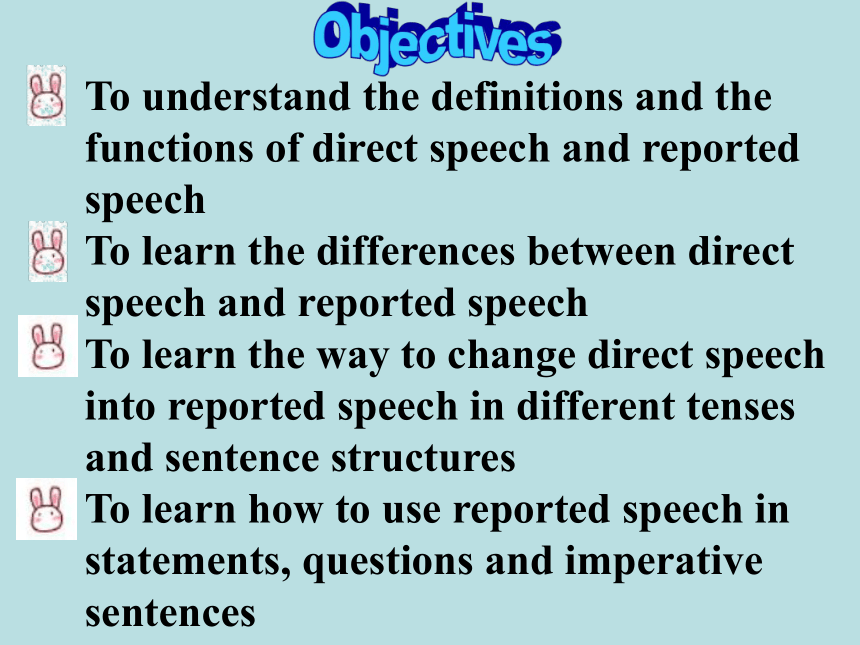
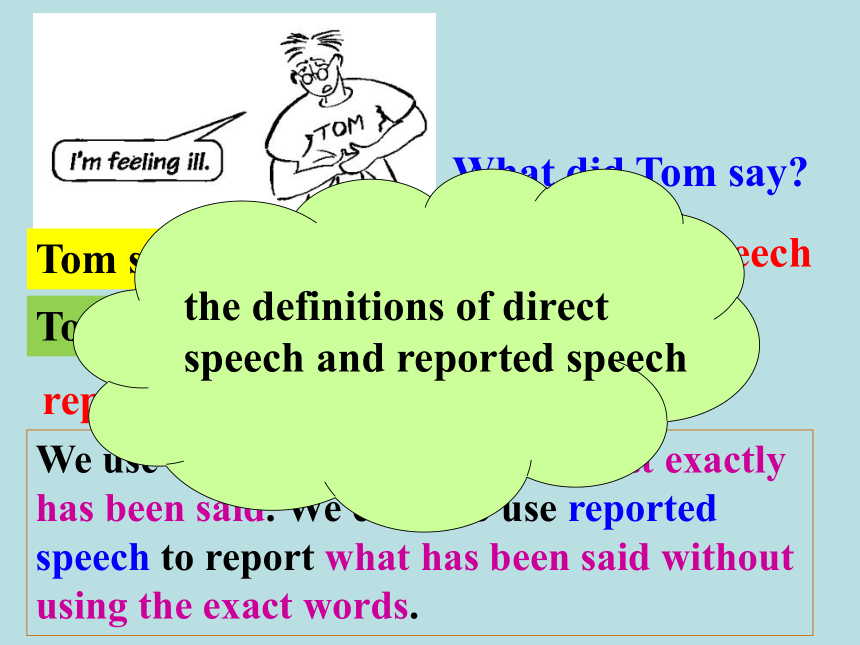
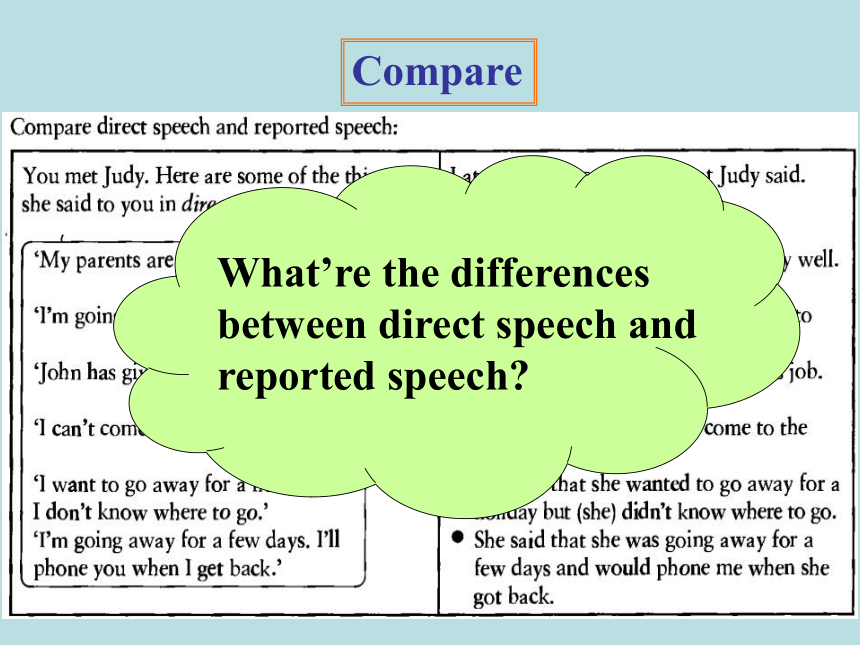
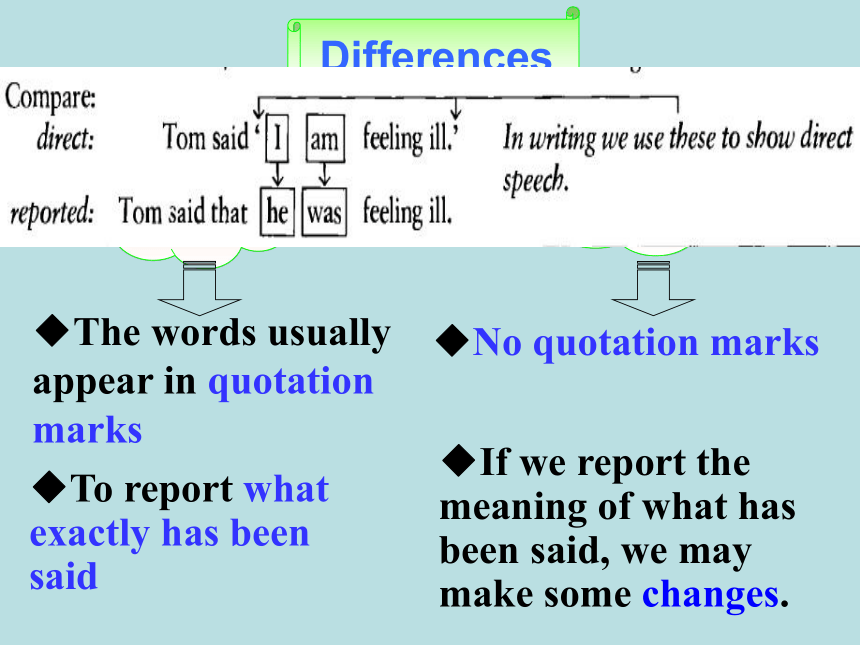
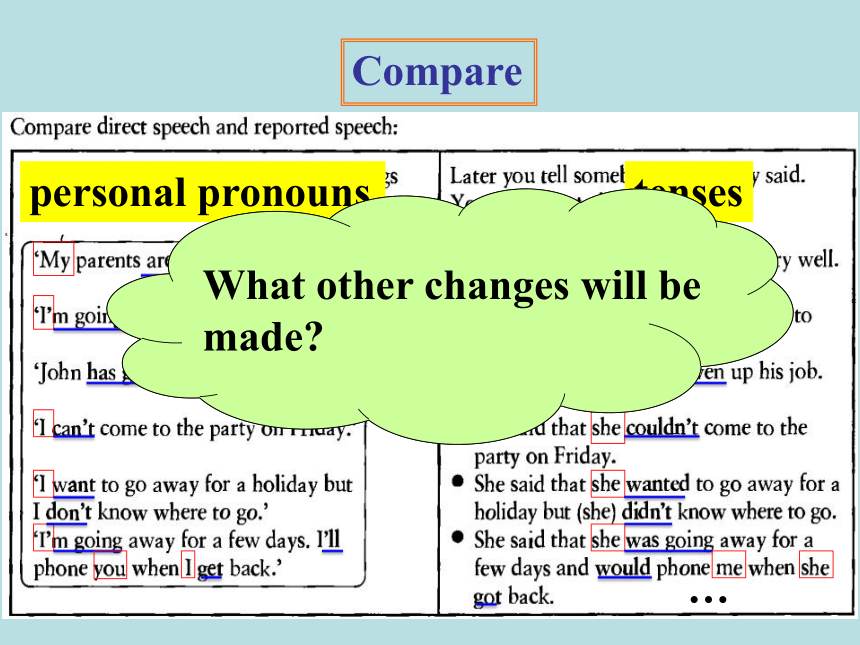

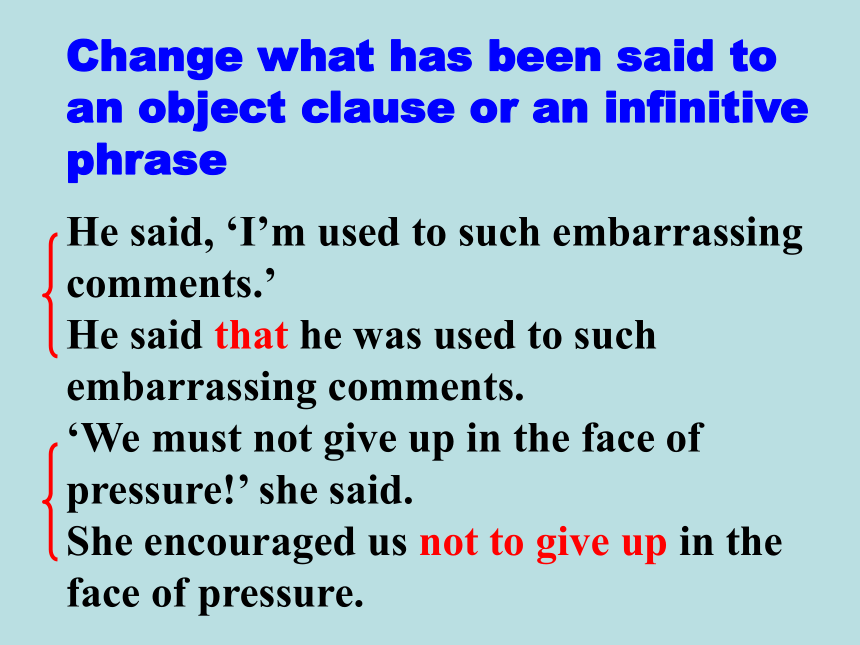
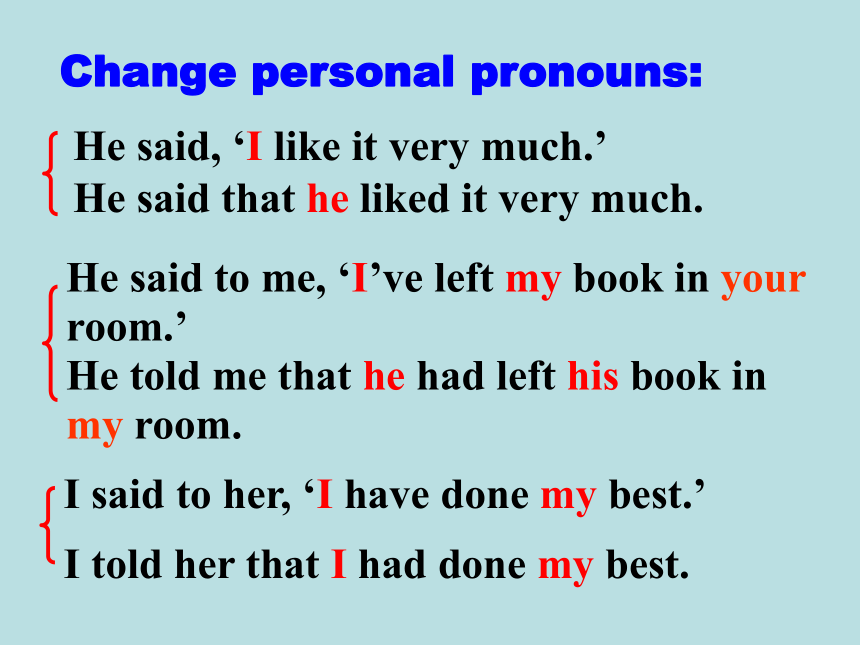
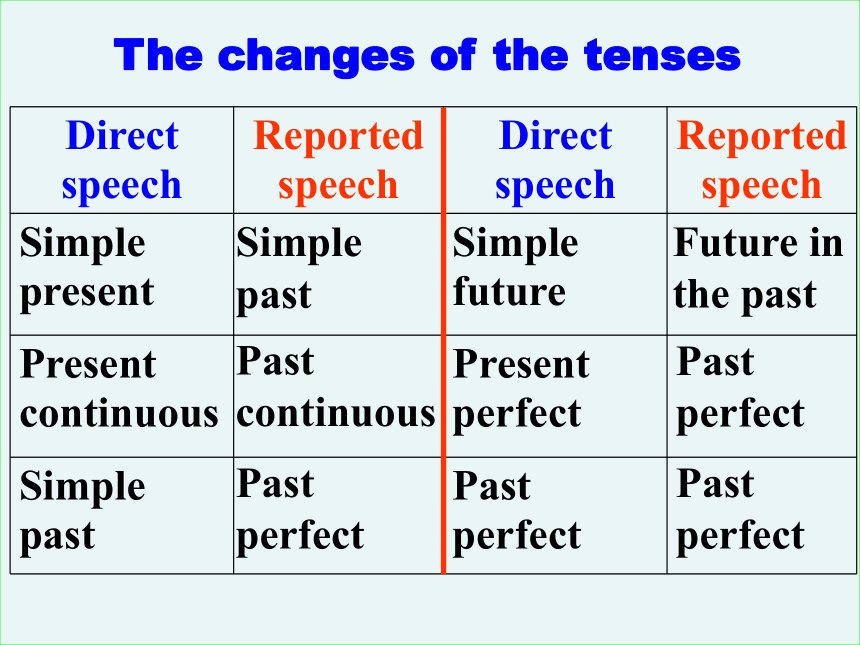
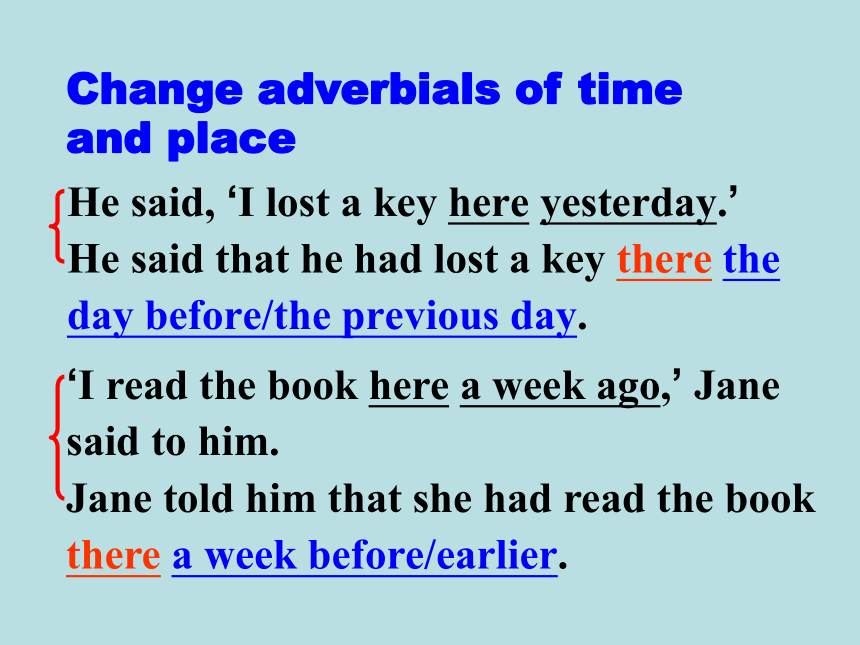
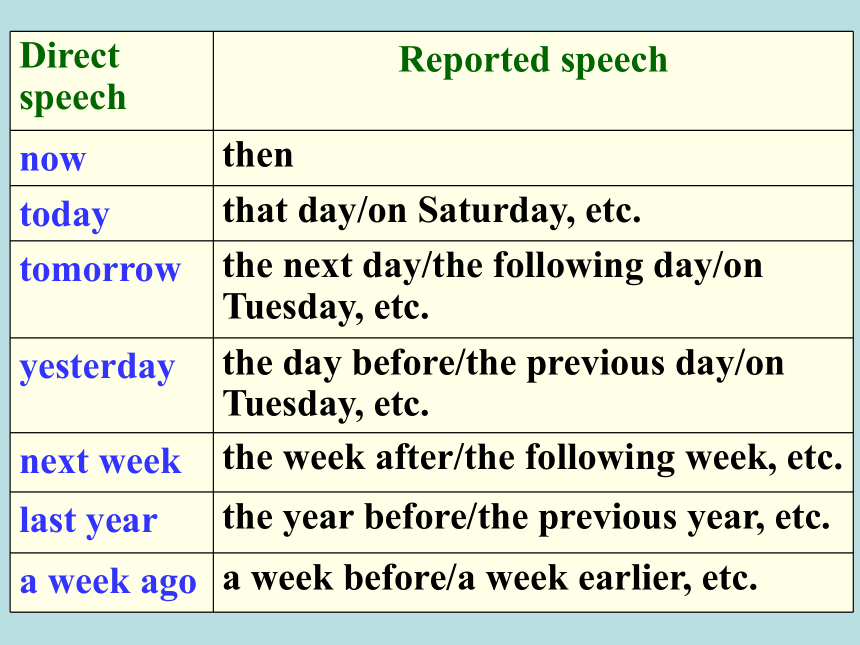
文档简介
课件53张PPT。 Direct speech and reported speechGrammar and usageObjectivesTo understand the definitions and the functions of direct speech and reported speech
To learn the differences between direct speech and reported speech
To learn the way to change direct speech into reported speech in different tenses and sentence structures
To learn how to use reported speech in statements, questions and imperative sentencesWhat did Tom say?Tom said, ‘I’m feeling ill.’Tom said that he was feeling ill.direct speechreported speech or indirect speechWe use direct speech to report what exactly has been said. We can also use reported speech to report what has been said without using the exact words.CompareDifferencesdirect speechreported speech◆To report what
exactly has been said◆The words usually appear in quotation
marks◆If we report the meaning of what has been said, we may make some changes.◆No quotation marksComparepersonal pronounstenses…How to change direct speech into
reported speech? Change what has been said to an
object clause or an infinitive phrase;
b. Change personal pronouns;
c. Change tenses;
d. Change adverbials of time and
place;
e. Other cases. Change what has been said to
an object clause or an infinitive
phraseHe said, ‘I’m used to such embarrassing comments.’
He said that he was used to such embarrassing comments.
‘We must not give up in the face of pressure!’ she said.
She encouraged us not to give up in the face of pressure.He said, ‘I like it very much.’
He said that he liked it very much.He said to me, ‘I’ve left my book in your room.’
He told me that he had left his book in my room.Change personal pronouns:I said to her, ‘I have done my best.’I told her that I had done my best.Past continuousPast perfectFuture in the pastPast perfectThe changes of the tensesSimple pastPast perfect He said, ‘I lost a key here yesterday.’
He said that he had lost a key there the
day before/the previous day.
‘I read the book here a week ago,’ Jane said to him.
Jane told him that she had read the book there a week before/earlier. Change adverbials of time
and placeOther casesShe said, ‘I’ll come here again tonight.’She said she would go there again that night.He said, ‘I want this.’He said that he wanted that.May said to Tom, ‘I’ll bring some photos here to you tomorrow.’May told Tom she would take some photos there to him the next day.由直接引语转变为间接引语,下列情况时态不变:1. 转述的内容是不变的真理:
The teacher said to the students, ‘Water freezes when the temperature falls below 0℃.’
→ The teacher told the students that water freezes when the temperature falls below 0℃.2. 转述的内容指经常的习惯:
He said to the doctor, “I smoke two packs every day.”
→ He told the doctor that he smokes two packs every day.
3. 转述历史事件:
The teacher said, “World War II ended in 1945.”
→ The teacher said that World War II ended in 1945.
4. 部分情态动词,如must, ought to, used to, had better等:
She said to me, “You must hurry up.”
→ She said that I must hurry up.How to use reported speech to report:statementsquestionsimperative sentences 陈述句:
Use noun clauses introduced by that to
report statements. ‘That’ can be omitted.‘I don’t like computers,’ Sarah said to her friends.Sarah said to her friendsthat I don’t likecomputers.tolddidn’tsheSarah told her friends that she didn’t like computers.Ted said (that) there wasn’t any trouble and that he was waiting for his change. 注意: 当两个或两个以上的宾语从句并列时, 仅能省略第一个that, 其余的不能省略。Ted said, ‘There isn’t any trouble and
I’m waiting for my change (零钱).’Is it easy to improve the condition of the soil?
( They asked him )They asked himifIt is easy to improve the condition of the soil.it is easy to improve the condition of the soil.askediswasThey asked him if it was easy to improve the condition of the soil.2. 一般疑问句:
Use noun clauses introduced by whether/if to report yes/no questions.When do you harvest the wheat?
( They asked him )They asked himwhenyou harvest the wheatyou harvest the wheat.heharvestedThey asked him when he harvested the wheat.harvested3. 特殊疑问句:
Use noun clauses introduced by wh-words to report wh-questions.To report imperative sentences, we use the
structure:
reporting verb + object + (not) + to-infinitive
‘Don’t worry, Mickey,’ Jen said.
Jen asked Mickey not to worry.
*other verbs can be used in this structure
‘Don’t believe every ad you read,’ Lily said to
me.
Lily advised me not to believe every ad I read.reporting verbobject(not)to-infinitiveadvise encourage invite recommend warn4. 祈使句: Practice: Change the following sentences into direct speech.1. Tom suggested that we should translate the book
into English.
2. The student explained that he really didn’t know
he had to finish the work a week before.
3. The teacher promised that he would give his
students a few holidays at the end of that month.
Tom said, ‘You’d better translate the book into English.’The student said, ‘I really don’t know I must finish the work a week ago.’The teacher said, ‘I will give my students a few holidays at the end of this month.’Practice: Change the following sentences into reported speech.1. My mother asked me, ‘Do you want to go to
the Great Wall with me?’
2. The teacher asked the boy, ‘How many pages
have you read today?’
My mother asked me whether I wanted to go to the Great Wall with her.
The teacher asked the boy how many pages he had read that day.The teacher said, ‘You’d better wear soft shoes.’
The teacher advised us to wear soft shoes.
The teacher said, ‘Think about it carefully before you answer.’
The teacher asked us to think about it carefully before we answered.Practice: Change the following sentences into reported speech.The teacher said, ‘Don’t leave your homework at home.’
The teacher reminded us not to leave our homework at home.
The teacher said, ‘Don’t worry about your exam.’
The teacher told us not to worry about our exam.
My brother ordered me to go there at
once.
My father warned us not to throw the
waste paper everywhere.
My brother said, ‘Come here at once.’My father said to us, ‘Don’t throw the waste paper everywhere.’Read Part A on page 11 and practise reporting questions using whether/if or wh-words.
Answers:
2. Wang Qin __________________________
___________________________________.
3. Lu Kai _____________________________
___________________________________.
4. Liu Fang ___________________________
___________________________________.
5. Gu Jin _____________________________.asked how it could help him remember English words.asked whether/if it taught listening and speaking asked what the designer woulddo if she was not satisfied with the softwareasked whether/if it was easy to useRead the advertising tips on page 11 and report each of them to your boss.
Answers:
2. The expert encourages us to
____________________________________.
3. The expert recommends that
____________________________________.
4. The expert suggests that _______________
____________________________________.
5. The expert tells us to __________________
____________________________________.use interesting and attractive photoswe (should) use eye-catching logoswe (should) makethe slogans short and easy to remembermake good use of colours to attract people’s attention由直接引语转变为间接引语,有时会引起时态的变化,注意以下几个方面。从句动词时态不变
She often says that all men and women are equal under the law.Review一般现在时
‘I know it,’ he said.一般过去时
He said that he knew it. 现在进行时
‘I’m making coffee for you all,’ she said.过去进行时
She said she was making coffee for us all. 现在完成时
‘I have seen her before,’ he said. 过去完成时
He said he had seen her before. 一般过去时
‘I saw her last Monday,’ he said.过去完成时
He said he had seen her the previous Monday. 过去完成时
‘Do you know Rick had been ill in bed for many days till he died?’ Jack asked.过去完成时
Jack asked if I knew Rick had been ill in bed for many days till he died. 一般将来时
He said, ‘We shall start tomorrow.’过去将来时
He said they would start the next day.that引导的名词性从句
Jane said that she was very fond of traveling.Reviewwhether / if引导的名词性从句
John asked Mary if that was her umbrella.wh-词引导的名词性从句
John asked Mary when she would return him the book.不定式
The officer ordered him not to leave his post.Individual activity请点击word图标I. 完成下列直接引语与间接引语的转换
(每空一词)。 1. Peter said, ‘I have found what’s wrong
with the computer.’ Peter said he _____ found what ______ wrong with the computer. 2. He said that he would keep us informed
of his daily life in university. He said, ‘_____ _____ keep ______
informed of my daily life in university.’hadwasI willyou3. ‘You must come here before five, Lily,’
he said. He told Lily that ____ must go _____ before five. 4. The boy told us he usually gets up at six
every day. The boy ______ to us, ‘___ usually _____
up at six every day.’shetheresaidI get5. ‘Did you read the book last week?’ he
asked. He asked __________ I had read the
book the week _______.
6. ‘Where have you been these days?’ he
asked. He asked me where _____ _____ been
_______ days.if/whetherbeforeI hadthose7. He asked, ‘Can you show me the way
to the nearest park?’
He asked me ___________ ___ ______
show ____ the way to the nearest park.
8. ‘Are you serious about learning to be a
musician?’ he asked Julia. He asked Julia _________ she _______
serious about learning to be a musician
or not.whether waswhether / if I couldhim9. ‘Please do your best and don’t always
complain about life,’ he said to Tom. He asked Tom to _______ his best and
______ ______ always complain about
life. 10. She asked the actor if he had anything
else he wanted to say to his fans. She said to the actor, ‘______ you have
anything else ______ ______ to say to
your fans?’donot toDoyou wantII.请将下列各句中的直接引语改为间接引语。1. The local reporter said, “The firefighters have arrived at the scene of the accident.”
____________________________________________________________________
2. Mary asked John, “Can you come and help me water my flowers?”
____________________________________________________________________
3. My workmate asked, “When will the meeting begin?”
____________________________________________________________________ The local reporter said (that) the firefighters had arrived at the scene of the accident. Mary asked John whether / if he could go to help her water her flowers.My workmate asked when the meeting would begin.4. The teacher asked Peter, “Why didn’t you attend the first class this morning?”
____________________________________________________________________
5. He suggested, “We can make the most of the information in the newspaper if possible.”
____________________________________________________________________
6. My father often said, “Don’t waste any chance to learn English.”
____________________________________________________________________The teacher asked Peter why he hadn’t attended the first class that morning.He advised us to make the most of the information in the newspaper if possible.My father often told me not to waste any chance to learn English.III. 按要求完成句子。 Later that day you tell another friend what Charlie said. Use reported speech.
1. Charlie said that he was living in London now.
2. He said that ____________________________
3. _______________________________________
4. _______________________________________
5. _______________________________________
6. _______________________________________
7. _______________________________________
8. _______________________________________
9. _______________________________________
10. ______________________________________
11. ______________________________________
12. ______________________________________2. He said that his father wasn’t very well.
3. He said that Sharon and Paul were getting married the
following month.
4. He said that Margaret had had a baby.
5. He said that he didn’t know what Fred was doing.
6. He said that he had seen Helen at a party in June and she
had seemed fine.
7. He said that he hadn’t seen Diane recently.
8. He said that he wasn’t enjoying his job very much.
9. He said that I could come and stay at his flat if I was ever in
London.
10. He said that his car had been stolen a few weeks earlier.
11. He said that he wanted to go on holiday but he couldn’t
afford it.
12. He said he would tell Ann he had seen me.Finish Part C1 and Part C2 on page 92.Homework
To learn the differences between direct speech and reported speech
To learn the way to change direct speech into reported speech in different tenses and sentence structures
To learn how to use reported speech in statements, questions and imperative sentencesWhat did Tom say?Tom said, ‘I’m feeling ill.’Tom said that he was feeling ill.direct speechreported speech or indirect speechWe use direct speech to report what exactly has been said. We can also use reported speech to report what has been said without using the exact words.CompareDifferencesdirect speechreported speech◆To report what
exactly has been said◆The words usually appear in quotation
marks◆If we report the meaning of what has been said, we may make some changes.◆No quotation marksComparepersonal pronounstenses…How to change direct speech into
reported speech? Change what has been said to an
object clause or an infinitive phrase;
b. Change personal pronouns;
c. Change tenses;
d. Change adverbials of time and
place;
e. Other cases. Change what has been said to
an object clause or an infinitive
phraseHe said, ‘I’m used to such embarrassing comments.’
He said that he was used to such embarrassing comments.
‘We must not give up in the face of pressure!’ she said.
She encouraged us not to give up in the face of pressure.He said, ‘I like it very much.’
He said that he liked it very much.He said to me, ‘I’ve left my book in your room.’
He told me that he had left his book in my room.Change personal pronouns:I said to her, ‘I have done my best.’I told her that I had done my best.Past continuousPast perfectFuture in the pastPast perfectThe changes of the tensesSimple pastPast perfect He said, ‘I lost a key here yesterday.’
He said that he had lost a key there the
day before/the previous day.
‘I read the book here a week ago,’ Jane said to him.
Jane told him that she had read the book there a week before/earlier. Change adverbials of time
and placeOther casesShe said, ‘I’ll come here again tonight.’She said she would go there again that night.He said, ‘I want this.’He said that he wanted that.May said to Tom, ‘I’ll bring some photos here to you tomorrow.’May told Tom she would take some photos there to him the next day.由直接引语转变为间接引语,下列情况时态不变:1. 转述的内容是不变的真理:
The teacher said to the students, ‘Water freezes when the temperature falls below 0℃.’
→ The teacher told the students that water freezes when the temperature falls below 0℃.2. 转述的内容指经常的习惯:
He said to the doctor, “I smoke two packs every day.”
→ He told the doctor that he smokes two packs every day.
3. 转述历史事件:
The teacher said, “World War II ended in 1945.”
→ The teacher said that World War II ended in 1945.
4. 部分情态动词,如must, ought to, used to, had better等:
She said to me, “You must hurry up.”
→ She said that I must hurry up.How to use reported speech to report:statementsquestionsimperative sentences 陈述句:
Use noun clauses introduced by that to
report statements. ‘That’ can be omitted.‘I don’t like computers,’ Sarah said to her friends.Sarah said to her friendsthat I don’t likecomputers.tolddidn’tsheSarah told her friends that she didn’t like computers.Ted said (that) there wasn’t any trouble and that he was waiting for his change. 注意: 当两个或两个以上的宾语从句并列时, 仅能省略第一个that, 其余的不能省略。Ted said, ‘There isn’t any trouble and
I’m waiting for my change (零钱).’Is it easy to improve the condition of the soil?
( They asked him )They asked himifIt is easy to improve the condition of the soil.it is easy to improve the condition of the soil.askediswasThey asked him if it was easy to improve the condition of the soil.2. 一般疑问句:
Use noun clauses introduced by whether/if to report yes/no questions.When do you harvest the wheat?
( They asked him )They asked himwhenyou harvest the wheatyou harvest the wheat.heharvestedThey asked him when he harvested the wheat.harvested3. 特殊疑问句:
Use noun clauses introduced by wh-words to report wh-questions.To report imperative sentences, we use the
structure:
reporting verb + object + (not) + to-infinitive
‘Don’t worry, Mickey,’ Jen said.
Jen asked Mickey not to worry.
*other verbs can be used in this structure
‘Don’t believe every ad you read,’ Lily said to
me.
Lily advised me not to believe every ad I read.reporting verbobject(not)to-infinitiveadvise encourage invite recommend warn4. 祈使句: Practice: Change the following sentences into direct speech.1. Tom suggested that we should translate the book
into English.
2. The student explained that he really didn’t know
he had to finish the work a week before.
3. The teacher promised that he would give his
students a few holidays at the end of that month.
Tom said, ‘You’d better translate the book into English.’The student said, ‘I really don’t know I must finish the work a week ago.’The teacher said, ‘I will give my students a few holidays at the end of this month.’Practice: Change the following sentences into reported speech.1. My mother asked me, ‘Do you want to go to
the Great Wall with me?’
2. The teacher asked the boy, ‘How many pages
have you read today?’
My mother asked me whether I wanted to go to the Great Wall with her.
The teacher asked the boy how many pages he had read that day.The teacher said, ‘You’d better wear soft shoes.’
The teacher advised us to wear soft shoes.
The teacher said, ‘Think about it carefully before you answer.’
The teacher asked us to think about it carefully before we answered.Practice: Change the following sentences into reported speech.The teacher said, ‘Don’t leave your homework at home.’
The teacher reminded us not to leave our homework at home.
The teacher said, ‘Don’t worry about your exam.’
The teacher told us not to worry about our exam.
My brother ordered me to go there at
once.
My father warned us not to throw the
waste paper everywhere.
My brother said, ‘Come here at once.’My father said to us, ‘Don’t throw the waste paper everywhere.’Read Part A on page 11 and practise reporting questions using whether/if or wh-words.
Answers:
2. Wang Qin __________________________
___________________________________.
3. Lu Kai _____________________________
___________________________________.
4. Liu Fang ___________________________
___________________________________.
5. Gu Jin _____________________________.asked how it could help him remember English words.asked whether/if it taught listening and speaking asked what the designer woulddo if she was not satisfied with the softwareasked whether/if it was easy to useRead the advertising tips on page 11 and report each of them to your boss.
Answers:
2. The expert encourages us to
____________________________________.
3. The expert recommends that
____________________________________.
4. The expert suggests that _______________
____________________________________.
5. The expert tells us to __________________
____________________________________.use interesting and attractive photoswe (should) use eye-catching logoswe (should) makethe slogans short and easy to remembermake good use of colours to attract people’s attention由直接引语转变为间接引语,有时会引起时态的变化,注意以下几个方面。从句动词时态不变
She often says that all men and women are equal under the law.Review一般现在时
‘I know it,’ he said.一般过去时
He said that he knew it. 现在进行时
‘I’m making coffee for you all,’ she said.过去进行时
She said she was making coffee for us all. 现在完成时
‘I have seen her before,’ he said. 过去完成时
He said he had seen her before. 一般过去时
‘I saw her last Monday,’ he said.过去完成时
He said he had seen her the previous Monday. 过去完成时
‘Do you know Rick had been ill in bed for many days till he died?’ Jack asked.过去完成时
Jack asked if I knew Rick had been ill in bed for many days till he died. 一般将来时
He said, ‘We shall start tomorrow.’过去将来时
He said they would start the next day.that引导的名词性从句
Jane said that she was very fond of traveling.Reviewwhether / if引导的名词性从句
John asked Mary if that was her umbrella.wh-词引导的名词性从句
John asked Mary when she would return him the book.不定式
The officer ordered him not to leave his post.Individual activity请点击word图标I. 完成下列直接引语与间接引语的转换
(每空一词)。 1. Peter said, ‘I have found what’s wrong
with the computer.’ Peter said he _____ found what ______ wrong with the computer. 2. He said that he would keep us informed
of his daily life in university. He said, ‘_____ _____ keep ______
informed of my daily life in university.’hadwasI willyou3. ‘You must come here before five, Lily,’
he said. He told Lily that ____ must go _____ before five. 4. The boy told us he usually gets up at six
every day. The boy ______ to us, ‘___ usually _____
up at six every day.’shetheresaidI get5. ‘Did you read the book last week?’ he
asked. He asked __________ I had read the
book the week _______.
6. ‘Where have you been these days?’ he
asked. He asked me where _____ _____ been
_______ days.if/whetherbeforeI hadthose7. He asked, ‘Can you show me the way
to the nearest park?’
He asked me ___________ ___ ______
show ____ the way to the nearest park.
8. ‘Are you serious about learning to be a
musician?’ he asked Julia. He asked Julia _________ she _______
serious about learning to be a musician
or not.whether waswhether / if I couldhim9. ‘Please do your best and don’t always
complain about life,’ he said to Tom. He asked Tom to _______ his best and
______ ______ always complain about
life. 10. She asked the actor if he had anything
else he wanted to say to his fans. She said to the actor, ‘______ you have
anything else ______ ______ to say to
your fans?’donot toDoyou wantII.请将下列各句中的直接引语改为间接引语。1. The local reporter said, “The firefighters have arrived at the scene of the accident.”
____________________________________________________________________
2. Mary asked John, “Can you come and help me water my flowers?”
____________________________________________________________________
3. My workmate asked, “When will the meeting begin?”
____________________________________________________________________ The local reporter said (that) the firefighters had arrived at the scene of the accident. Mary asked John whether / if he could go to help her water her flowers.My workmate asked when the meeting would begin.4. The teacher asked Peter, “Why didn’t you attend the first class this morning?”
____________________________________________________________________
5. He suggested, “We can make the most of the information in the newspaper if possible.”
____________________________________________________________________
6. My father often said, “Don’t waste any chance to learn English.”
____________________________________________________________________The teacher asked Peter why he hadn’t attended the first class that morning.He advised us to make the most of the information in the newspaper if possible.My father often told me not to waste any chance to learn English.III. 按要求完成句子。 Later that day you tell another friend what Charlie said. Use reported speech.
1. Charlie said that he was living in London now.
2. He said that ____________________________
3. _______________________________________
4. _______________________________________
5. _______________________________________
6. _______________________________________
7. _______________________________________
8. _______________________________________
9. _______________________________________
10. ______________________________________
11. ______________________________________
12. ______________________________________2. He said that his father wasn’t very well.
3. He said that Sharon and Paul were getting married the
following month.
4. He said that Margaret had had a baby.
5. He said that he didn’t know what Fred was doing.
6. He said that he had seen Helen at a party in June and she
had seemed fine.
7. He said that he hadn’t seen Diane recently.
8. He said that he wasn’t enjoying his job very much.
9. He said that I could come and stay at his flat if I was ever in
London.
10. He said that his car had been stolen a few weeks earlier.
11. He said that he wanted to go on holiday but he couldn’t
afford it.
12. He said he would tell Ann he had seen me.Finish Part C1 and Part C2 on page 92.Homework
